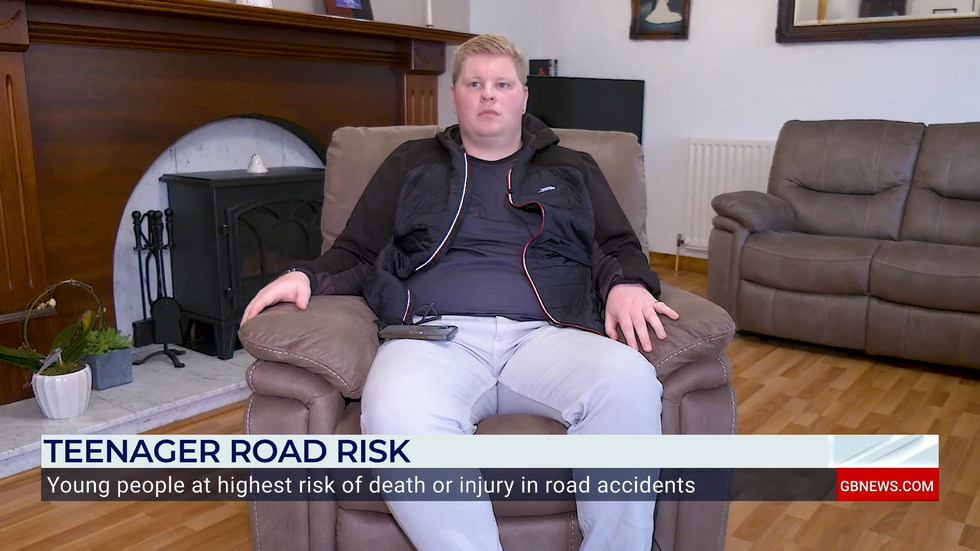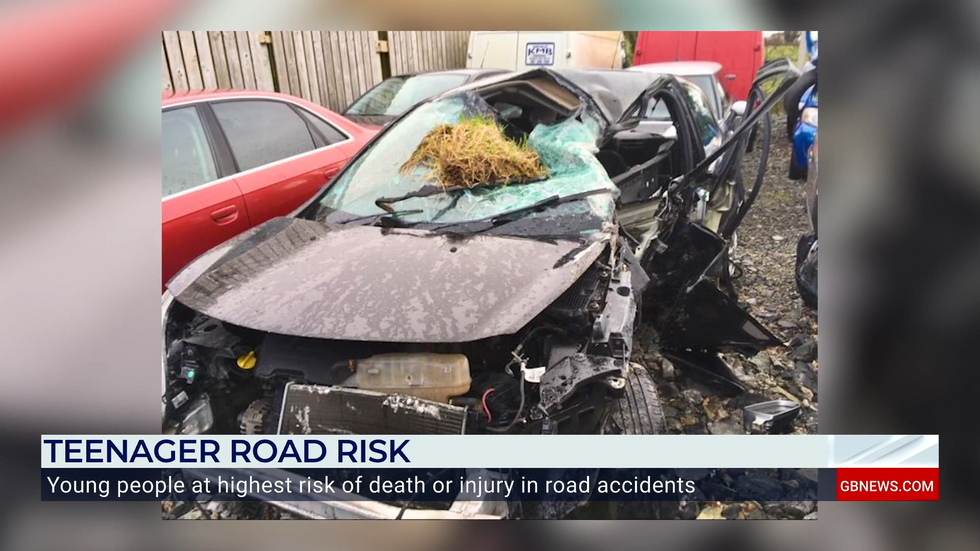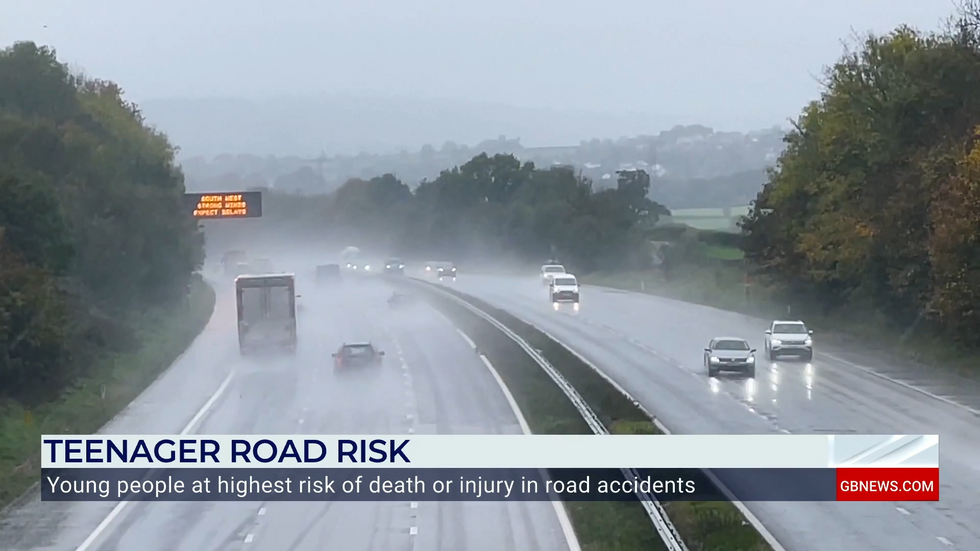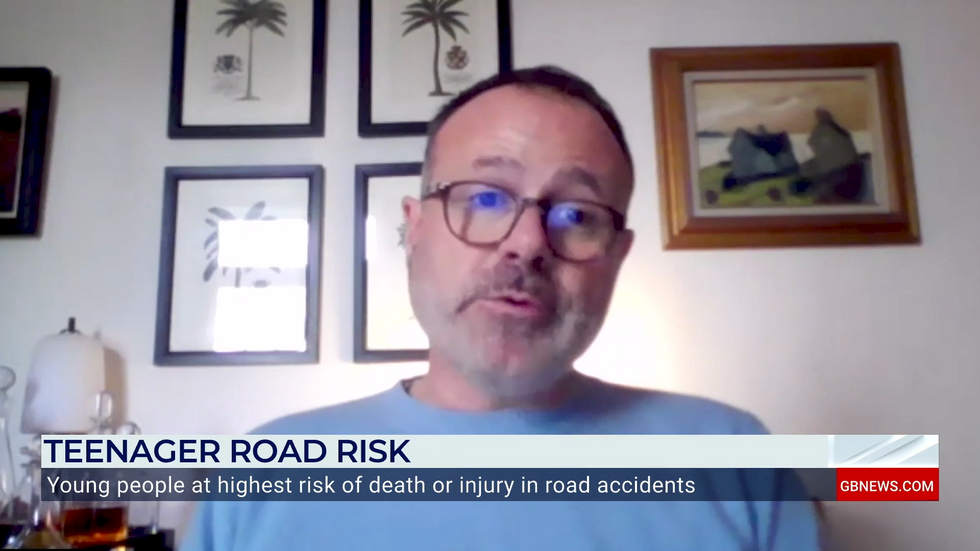‘I broke all my ribs and had collapsed lungs after a crash… Doctors thought I’d never wake up’
Drivers have been urged to act responsibly as one young man laid bare the details of his horror crash to GB News.
Road Safety Week is a new campaign, and the largest of its type, that seeks to reduce road deaths and injuries.
It comes as figures from the charity, Break, show that more than 1,700 people die on UK roads every year. Another 30,000 receive serious life-changing injuries.
Young people between the ages of 17 and 24 are most at risk, with those under the age of 25 nearly twice as likely to make a claim for a crash involving a serious injury than older drivers, according to research from Admiral Car Insurance.
Ross Scott, from Ballynahinch in County Down, was 23 years old when he was involved in a serious car accident.
He had driven to play his usual Saturday evening game of football, but heavy rain meant the game was called off.

When Ross did not return home after several hours, his family began to worry. Police found him trapped in his car just after midnight.
It had aquaplaned on rainwater and careered into a field at the side of the road, before hitting a tree.
Ross suffered a severe brain injury and was put in a coma for three months to recover. Doctors told his family that he might never wake up.
The young driver told GB News about the extent of his injuries after the accident in Northern Ireland in 2019 and said: “I had broken skull plate, bleeds on the brain, a broken eye socket, broke my left shoulder, a brachial plexus [nerve damage], I broke all my ribs, tore my spleen, had collapsed lungs and my heart moved to the back of my chest.”
LATEST DEVELOPMENTS:
- Masked men smashed through Windsor Castle security gate to raid estate as Kate, William and children slept
- Tiktoker sparks fury after calling to ‘make Christmas Palestinian’
- Two police constables charged with four counts of sexual assault while off-duty

When Ross emerged from his coma, he faced a new reality. The former electrician had to use a wheelchair for seven months and went through extensive rehabilitation to learn how to walk again.
He said: “Before the car accident, I had a good life and was able to travel, work and do stuff. I actually enjoyed my work, but now I am no longer allowed to go back to work through health and safety because of all the injuries, I wouldn’t get insurance to go on a work site.
“It used to take me a day to wire a house, and now, honestly, it would probably now take me about a year.
“My whole life is just not working and sitting around the house and you wonder what you’re doing with yourself.
“So that’s why I’m now volunteering for the Special Olympics as a football coach. I’ll never be 100 per cent back fully to what it was, but it’s just sort of accepting and dealing with it and making the best of what you have.
“I was really unlucky in a way that it [the car accident] happened, but in a way, I’m lucky to still be here to tell a tale.”

Ross has been a dedicated member of Headway Lisburn since 2021. The UK-wide charity works to improve life after brain injury by providing vital support and information services.
To honour Ross for his ‘incredible determination and resilience’, he has been nominated for Achiever of the Year by the charity and will be appearing at their award ceremony in London on December 5.
One of Ross’s most significant achievements post-brain injury is his ‘triumphant return to the football field’ with the Linfield seniors disabled football team, which includes being recognised as the top scorer and getting involved in coaching and inspiring others through sharing his story.

It comes as research reveals that serious crashes involving under-25s remain unacceptably high. New data from UK police forces show that serious car injuries and fatalities among young people (aged 17-24) have barely changed from 2022 to 2023.
This is despite the introduction of legislation including increased penalties for causing death by dangerous driving and tighter restrictions for phone usage on the road.
As the dark nights and winter weather conditions set in, police are encouraging people to act responsibly on the roads.
Constable Stephen Dixon, of the PSNI Collision Investigation Unit, said: “The last thing we want is for another family to lose a loved one unnecessarily on the roads through poor decision-making.
“Do not take drink or drugs whilst driving, or before you get behind the wheel of a vehicle. Slow down, and drive with courtesy and respect. Do not be careless or dangerous in your manoeuvres.
“Never use your mobile phone and always wear your seatbelt.”
This Road Safety Week parents are being urged to have conversations with their children about safe driving and how it should stand alongside other foundational discussions like safe sex, consent, drug and alcohol risks as well as domestic violence, as injuries and fatalities among young drivers soar.
Admiral Car Insurance wants families to reclaim the phrase ‘drive safely’ and has created a short film called Words To Live By, to raise awareness.
The campaign is driven by new UK national research that reveals the words ‘drive safely’ have lost their meaning and that over half (54 per cent) of families rarely or never have meaningful ‘chats’ about road safety, unless it’s before a longer journey.
Justin Beddows, Admiral Consumer PR Specialist, told GB News: “Young drivers are involved in about a fifth of all collisions where there’s a serious injury or death and our own claims data shows that drivers under the age of 25, and nearly twice as likely to make a claim for a crash involving serious injury than somebody over 25.
“So we just thought it was really important to try and do something to try and address driver behaviour amongst young people.”
Admiral has teamed up with Headway for the campaign to drive home the importance of safety on the roads and remind young drivers of the lasting impacts that accidents can cause.
To find out more, click here.

